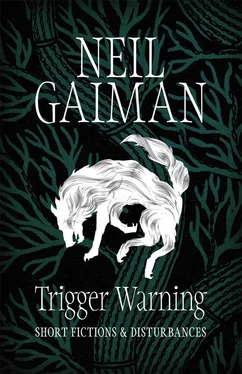Neil Gaiman - Trigger Warning - Short Fictions and Disturbances
Здесь есть возможность читать онлайн «Neil Gaiman - Trigger Warning - Short Fictions and Disturbances» весь текст электронной книги совершенно бесплатно (целиком полную версию без сокращений). В некоторых случаях можно слушать аудио, скачать через торрент в формате fb2 и присутствует краткое содержание. Год выпуска: 2015, Издательство: Headline, Жанр: Старинная литература, на английском языке. Описание произведения, (предисловие) а так же отзывы посетителей доступны на портале библиотеки ЛибКат.
- Название:Trigger Warning: Short Fictions and Disturbances
- Автор:
- Издательство:Headline
- Жанр:
- Год:2015
- ISBN:нет данных
- Рейтинг книги:4 / 5. Голосов: 1
-
Избранное:Добавить в избранное
- Отзывы:
-
Ваша оценка:
- 80
- 1
- 2
- 3
- 4
- 5
Trigger Warning: Short Fictions and Disturbances: краткое содержание, описание и аннотация
Предлагаем к чтению аннотацию, описание, краткое содержание или предисловие (зависит от того, что написал сам автор книги «Trigger Warning: Short Fictions and Disturbances»). Если вы не нашли необходимую информацию о книге — напишите в комментариях, мы постараемся отыскать её.
Trigger Warning: Short Fictions and Disturbances — читать онлайн бесплатно полную книгу (весь текст) целиком
Ниже представлен текст книги, разбитый по страницам. Система сохранения места последней прочитанной страницы, позволяет с удобством читать онлайн бесплатно книгу «Trigger Warning: Short Fictions and Disturbances», без необходимости каждый раз заново искать на чём Вы остановились. Поставьте закладку, и сможете в любой момент перейти на страницу, на которой закончили чтение.
Интервал:
Закладка:
‘That’s all tosh,’ said the tinker. ‘She would have cursed the princess whether she’d been invited to the naming-day party or not. She was one of those forest witches, driven to the margins a thousand years ago, and a bad lot. She cursed the babe at birth, such that when the girl was eighteen she would prick her finger and sleep forever.’
The fat-faced man wiped his forehead. He was sweating, although it was not warm. ‘As I heard it, she was going to die, but another fairy, a good one this time, commuted her magical death sentence to one of sleep. Magical sleep,’ he added.
‘So,’ said the sot. ‘She pricked her finger on something-or-other. And she fell asleep. And the other people in the castle – the lord and the lady, the butcher, baker, milkmaid, lady-in-waiting – all of them slept, as she slept. None of them have aged a day since they closed their eyes.’
‘There were roses,’ said the pot girl. ‘Roses that grew up around the castle. And the forest grew thicker, until it became impassible. This was, what, a hundred years ago?’
‘Sixty. Perhaps eighty,’ said a woman who had not spoken until now. ‘I know, because my aunt Letitia remembered it happening, when she was a girl, and she was no more than seventy when she died of the bloody flux, and that was only five years ago come Summer’s End.’
‘. . . and brave men,’ continued the pot girl. ‘Aye, and brave women too, they say, have attempted to travel to the Forest of Acaire, to the castle at its heart, to wake the princess, and, in waking her, to wake all the sleepers, but each and every one of those heroes ended their lives lost in the forest, murdered by bandits, or impaled upon the thorns of the rosebushes that encircle the castle—’
‘Wake her how?’ asked the middle-sized dwarf, hand still clutching his rock, for he thought in essentials.
‘The usual method,’ said the pot girl, and she blushed. ‘Or so the tales have it.’
‘Right,’ said the tallest dwarf. ‘So, bowl of cold water poured on the face and a cry of “ Wakey! Wakey! ”?’
‘A kiss,’ said the sot. ‘But nobody has ever got that close. They’ve been trying for sixty years or more. They say the witch—’
‘Fairy,’ said the fat man.
‘Enchantress,’ corrected the pot girl.
‘Whatever she is,’ said the sot. ‘She’s still there. That’s what they say. If you get that close. If you make it through the roses, she’ll be waiting for you. She’s old as the hills, evil as a snake, all malevolence and magic and death.’
The smallest dwarf tipped his head on one side. ‘So, there’s a sleeping woman in a castle, and perhaps a witch or fairy there with her. Why is there also a plague?’
‘Over the last year,’ said the fat-faced man. ‘It started in the north, beyond the capital. I heard about it first from travellers coming from Stede, which is near the Forest of Acaire.’
‘People fell asleep in the towns,’ said the pot girl.
‘Lots of people fall asleep,’ said the tallest dwarf. Dwarfs sleep rarely: twice a year at most, for several weeks at a time, but he had slept enough in his long lifetime that he did not regard sleep as anything special or unusual.
‘They fall asleep whatever they are doing, and they do not wake up,’ said the sot. ‘Look at us. We fled the towns to come here. We have brothers and sisters, wives and children, sleeping now in their houses or cowsheds, at their workbenches. All of us.’
‘It is moving faster and faster,’ said the thin, red-haired woman who had not spoken previously. ‘Now it covers a mile, perhaps two miles, each day.’
‘It will be here tomorrow,’ said the sot, and he drained his flagon, gestured to the innkeeper to fill it once more. ‘There is nowhere for us to go to escape it. Tomorrow, everything here will be asleep. Some of us have resolved to escape into drunkenness before the sleep takes us.’
‘What is there to be afraid of in sleep?’ asked the smallest dwarf. ‘It’s just sleep. We all do it.’
‘Go and look,’ said the sot. He threw back his head, and drank as much as he could from his flagon. Then he looked back at them, with eyes unfocused, as if he were surprised to still see them there. ‘Well, go on. Go and look for yourselves.’ He swallowed the remaining drink, then he laid his head upon the table.
They went and looked.
***
‘Asleep?’ asked the queen. ‘Explain yourselves. How so, asleep?’
The dwarf stood upon the table so he could look her in the eye. ‘Asleep,’ he repeated. ‘Sometimes crumpled upon the ground. Sometimes standing. They sleep in their smithies, at their awls, on milking stools. The animals sleep in the fields. Birds, too, slept, and we saw them in trees or dead and broken in fields where they had fallen from the sky.’
The queen wore a wedding gown, whiter than the snow. Around her, attendants, maids of honour, dressmakers and milliners clustered and fussed.
‘And why did you three also not fall asleep?’
The dwarf shrugged. He had a russet-brown beard that had always made the queen think of an angry hedgehog attached to the lower portion of his face. ‘Dwarfs are magical things. This sleep is a magical thing also. I felt sleepy, mind.’
‘And then?’
She was the queen, and she was questioning him as if they were alone. Her attendants began removing her gown, taking it away, folding and wrapping it, so the final laces and ribbons could be attached to it, so it would be perfect.
Tomorrow was the queen’s wedding day. Everything needed to be perfect.
‘By the time we returned to Foxen’s Inn they were all asleep, every man jack-and-jill of them. It is expanding, the zone of the spell, a few miles every day.’
The mountains that separated the two lands were impossibly high, but not wide. The queen could count the miles. She pushed one pale hand through her raven-black hair, and she looked most serious.
‘What do you think, then?’ she asked the dwarf. ‘If I went there. Would I sleep, as they did?’
He scratched his arse, unselfconsciously. ‘You slept for a year,’ he said. ‘And then you woke again, none the worse for it. If any of the bigguns can stay awake there, it’s you.’
Outside, the townsfolk were hanging bunting in the streets and decorating their doors and windows with white flowers. Silverware had been polished and protesting children had been forced into tubs of lukewarm water (the oldest child always got the first dunk and the hottest, cleanest water) and then scrubbed with rough flannels until their faces were raw and red. They were then ducked under the water, and the backs of their ears were washed as well.
‘I am afraid,’ said the queen, ‘that there will be no wedding tomorrow.’
She called for a map of the kingdom, identified the villages closest to the mountains, sent messengers to tell the inhabitants to evacuate to the coast or risk royal displeasure.
She called for her first minister and informed him that he would be responsible for the kingdom in her absence, and that he should do his best neither to lose it nor to break it.
She called for her fiancé and told him not to take on so, and that they would still be married, even if he was but a prince and she already a queen, and she chucked him beneath his pretty chin and kissed him until he smiled.
She called for her mail shirt.
She called for her sword.
She called for provisions, and for her horse, and then she rode out of the palace, towards the east.
***
It was a full day’s ride before she saw, ghostly and distant, like clouds against the sky, the shape of the mountains that bordered the edge of her kingdom.
The dwarfs were waiting for her, at the last inn in the foothills of the mountains, and they led her down deep into the tunnels, the way that the dwarfs travel. She had lived with them, when she was little more than a child, and she was not afraid.
Читать дальшеИнтервал:
Закладка:
Похожие книги на «Trigger Warning: Short Fictions and Disturbances»
Представляем Вашему вниманию похожие книги на «Trigger Warning: Short Fictions and Disturbances» списком для выбора. Мы отобрали схожую по названию и смыслу литературу в надежде предоставить читателям больше вариантов отыскать новые, интересные, ещё непрочитанные произведения.
Обсуждение, отзывы о книге «Trigger Warning: Short Fictions and Disturbances» и просто собственные мнения читателей. Оставьте ваши комментарии, напишите, что Вы думаете о произведении, его смысле или главных героях. Укажите что конкретно понравилось, а что нет, и почему Вы так считаете.







